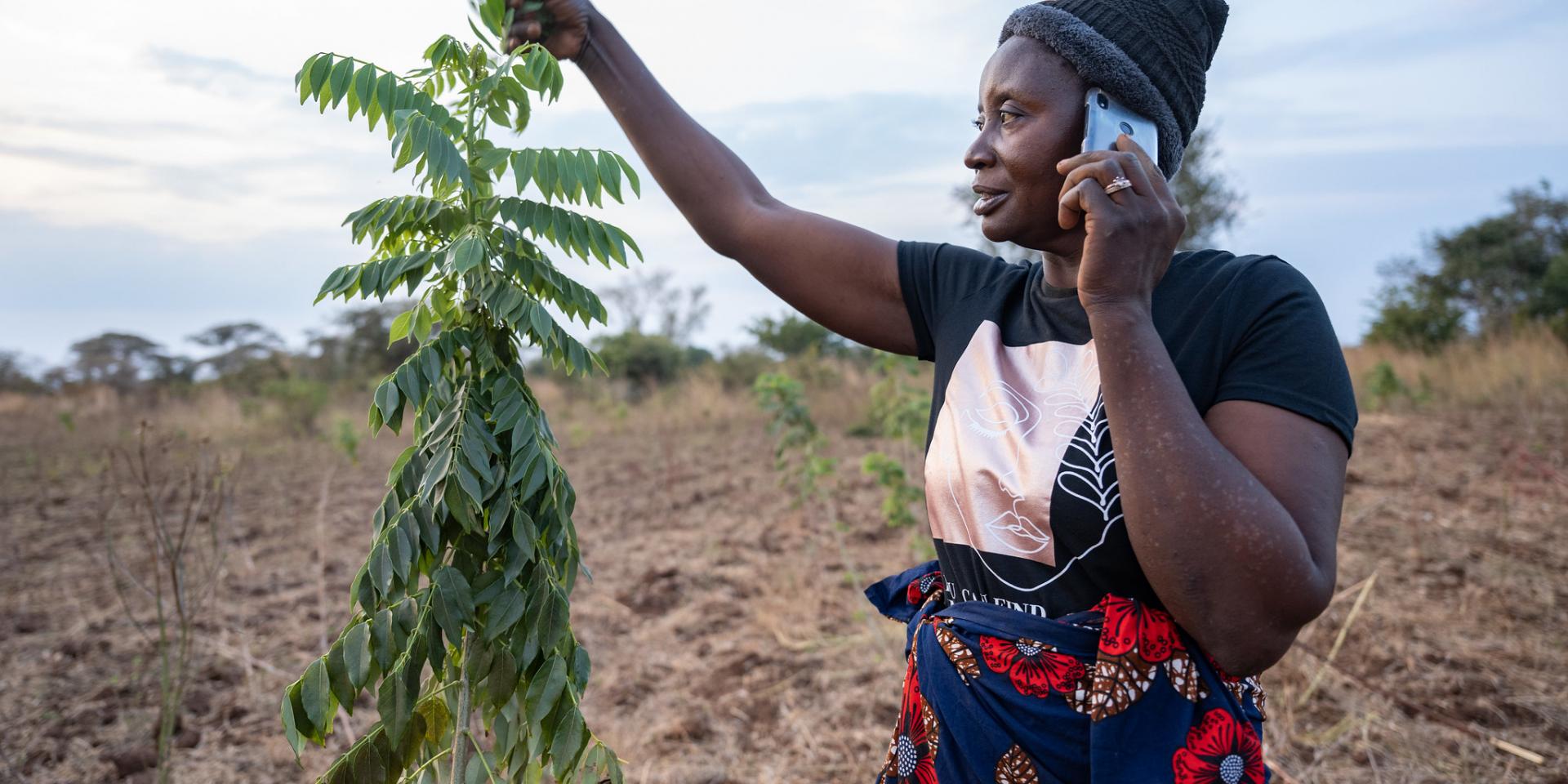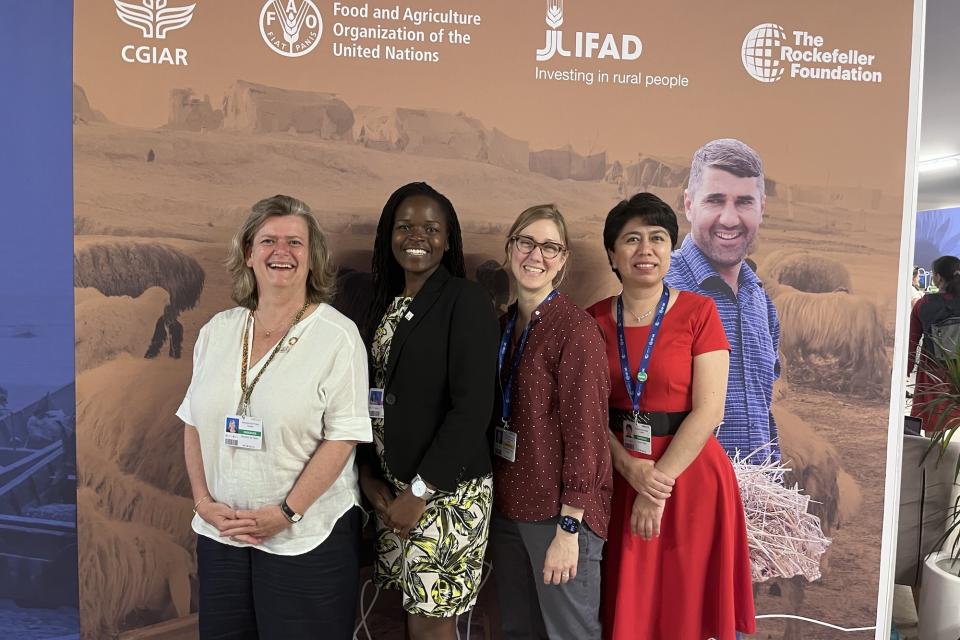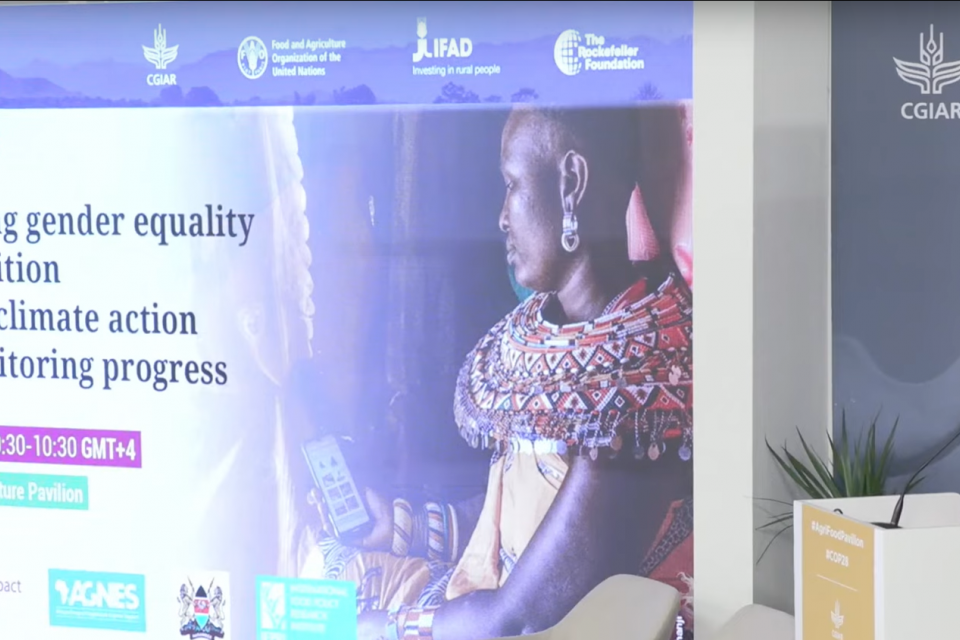Kenya reports progress, sets priorities for gender-responsive climate action
 AICCRA/ Kelvin Trautman, KANDS Collective
AICCRA/ Kelvin Trautman, KANDS Collective
Kenya recently evaluated the country’s progress in implementing the UNFCCC Gender Action Plan, recognizing contributions and support from the CGIAR GENDER Impact Platform.
In a recently submitted evaluation report, Kenya recognized the CGIAR GENDER Impact Platform for its contributions to the country’s progress toward priorities laid out in the United Nations Framework Convention on Climate Change (UNFCCC) Gender Action Plan (GAP).
The GAP, part of the UNFCCC’s Enhanced Lima Work Programme, aims to advance gender-responsive climate action. The implementation of the current GAP is coming to an end later this year, and all Parties to the Convention, including Kenya and observer organizations like CGIAR, were invited to carry out evaluations to feed into discussions on next steps for the UNFCCC’s gender priorities. These evaluations, captured into a recently published synthesis report, are the basis for ongoing discussions at the Bonn Climate Change Conference.
The CGIAR GENDER Impact Platform has worked with Kenya’s delegation of gender and climate change focal points, and other partner organizations, on its evaluation report, assessing the country’s progress, challenges, gaps and priorities in implementing the GAP so far.
“CGIAR’s expertise was instrumental in the process of reviewing the GAP. The support of partners like CGIAR was immensely valuable to Kenya’s delegation,” said Jackline Makokha, Kenya’s National Gender and Climate Change Focal Point (State Department for Gender and Affirmative Action).
This work follows years of engagement between Kenya’s climate negotiators and CGIAR GENDER researchers, including on mapping climate–agriculture–gender inequality hotspots. Makokha emphasized the practicality of GENDER’s support of Kenya’s implementation activities: “Their contributions ensured that the GAP’s priorities are aligned with both global best practices and local realities. CGIAR’s assistance helped us incorporate evidence-based activities that are beneficial to vulnerable groups, especially women.”
What is the Enhanced Lima Work Programme?
Aiming for behavior change that would promote transformation to a more sustainable planet, the 1992 ‘Rio Convention’ saw three conventions (among other action plans) formed: the United Nations Framework Convention on Climate Change, the Convention on Biological Diversity, and the United Nations Convention to Combat Desertification.
Of the three, UNFCCC initially lacked mandates on women’s rights and gender equality, but in 2014 began its Lima Work Programme on Gender. Three years later, it adopted its first Gender Action Plan, then in 2019 adopted the enhanced Lima Work Programme on Gender and Gender Action Plan.
The Lima program and GAP aim to advance gender balance and integrate gender considerations into global work and policies, to achieve gender-responsive climate policy and action.
Vivian Atakos, who leads CGIAR GENDER’s Global Engagement and Policy, highlighted the team’s work in contributing to the goal of advancing gender equality in food systems: “We are inspired by Kenya’s recognition of our support and that of other partners, and how this has aided their progress in meeting the goals of the UNFCCC Enhanced Lima Work Programme and its Gender Action Plan. We are committed to continue working together on gender and climate change policy processes, availing much-needed evidence from CGIAR, as Parties embark on negotiations about next steps for gender-responsive climate action under UNFCCC.”
This work goes to meeting a key mandate of the CGIAR GENDER Impact Platform, that of engaging with partners to shape global gender policy discourse in agri-food systems.
Data-driven and evidence-based guidance: foundation for prioritizing key interventions
Synthesizing and providing evidence from CGIAR and partners’ work was an important part of the GAP implementation, Atakos said. “We’re proud of the impact we are having, including that we are supporting global processes. But we are even more committed to continue working together on these gender and climate change policy processes.”
Makokha said that CGIAR GENDER’s deep understanding of issues such as sustainable agriculture, climate resilience, and gender integration in agricultural practices provided a solid foundation for identifying and prioritizing key areas of intervention.
“CGIAR’s research and data-driven approach helped us to formulate evidence-based strategies that address the unique challenges women and other vulnerable groups face in agriculture, including access to resources, technology and markets,” she said.
The Platform’s on-ground projects and experiences—driven by gender experts in CGIAR research centers spread out in various regions worldwide—were also used to illustrate strides made in gender equality and women’s empowerment, alongside challenges that ought to be addressed going forward.
The Kenyan delegation relied on and mentioned the CGIAR GENDER for multiple interventions that have aided Kenya in furthering gender-responsive climate action, such as:
- Kenya’s UNFCCC Focal Points have been supported by several organizations, including the CGIAR GENDER Impact Platform, to attend the UNFCCC processes and knowledge exchange forums.
- Several entities have developed communication and social media engagement strategies, including the CGIAR GENDER Impact Platform.
- Established platforms on gender and climate change, e.g., the CGIAR GENDER Impact Platform.
“CGIAR’s expertise in agricultural research and development assisted the team to reflect on the latest scientific evidence and best practices that were useful in the review,” Makokha said.

Jackline Makokha, national climate change and gender focal point, State Department of Gender and Affirmative Action (Kenya), guiding discussions to review enhanced Lima work program on gender.
CGIAR GENDER expertise set to accelerate progress on Kenya Vision 2030
Kenya’s evaluation report mentions that despite much progress in GAP milestones at higher levels, there is a risk of “disconnect between the GAP and its potential to trigger significant and visible grassroots/local action,” mostly because of resourcing difficulties.
With that in mind, the delegation recommended future priorities that “that would catalyze gender-responsive grassroots climate action” by integrating gender issues into climate change considerations during development planning within Kenya Vision 2030, the country’s long-term development blueprint.
“We firmly believe that CGIAR’s inputs can significantly contribute to achieving Kenya Vision 2030,” Makokha said. “With CGIAR’s expertise in sustainable agriculture, climate resilience and gender integration, we can accelerate progress towards its key goals. Their support helps us implement innovative solutions.”
In its evaluation of the GAP, Kenya’s delegation of gender and climate change focal points highlight that the next iteration of the GAP would be expected to foster more inclusive and sustainable practices in communities such as in Kenya. By addressing gender disparities more effectively, vulnerable people should have improved access to resources, education and economic opportunities. That empowerment can lead to better livelihoods and increased productivity.
“Our hope is that these changes will not only uplift vulnerable groups, but also drive broader community development, reducing poverty and enhancing resilience for all,” said Makokha.
“The next GAP should, therefore, focus on how to leverage the UNFCCC processes and mechanisms to achieve local climate action and address the ever-increasing losses and damages due to climate change impacts.”
Kenya submitted that the next GAP should include priorities such as to:
- Support parties to develop tools and methodologies for gender analysis, designing, implementing and monitoring gender responsive climate policies and actions.
- Support National Gender and Climate Change Focal Points forums to enhance capacity building, experience sharing, knowledge exchange, best practices, peer to peer learning, and participation in regional and international meetings.
- Support gender and climate change negotiators, participation in regional and international meetings.
- Provide technical and financial support for the development and implementation of National Gender Action Plans or the domestication and implementation of the Gender Action Plans.
- Support women, youth and other vulnerable groups to implement gender responsive climate actions at the grass root level.
- Facilitate access to technologies that reduce women’s work-load in the household as well as to support sustainable livelihoods, including in agriculture.
- Enhance the production and use of gender data and information in climate action across sectors to assist planning, implementation, monitoring, and evaluation.
- Identify and build the capacity of gender champions in each thematic area in adaptation, mitigation and means of implementation and establish multistakeholder innovative platforms on gender and climate change.
- Strengthen African countries’ national gender institutions’ capacity to integrate and uptake gender and climate change issues and to support the UNFCCC Gender Action Plan and other regional commitments as appropriate.
- Allocate, under the UNFCCC funding mechanisms a special window for the implementation of the National GAPs.

